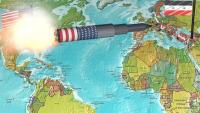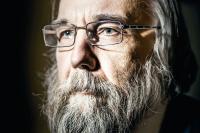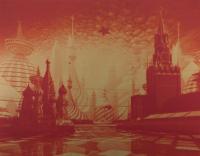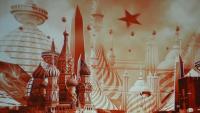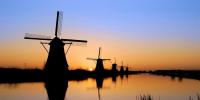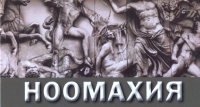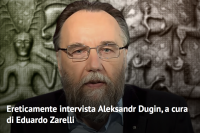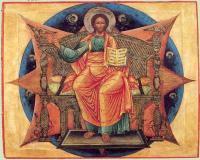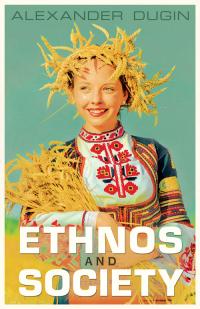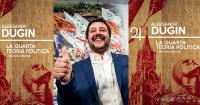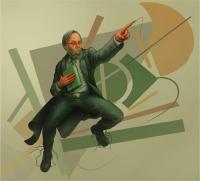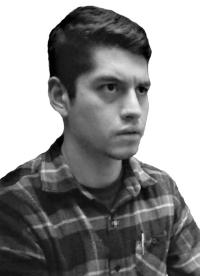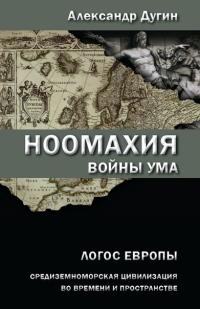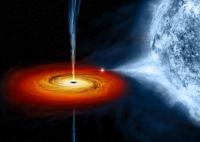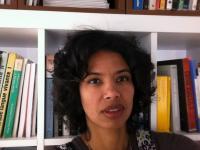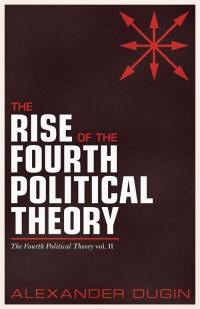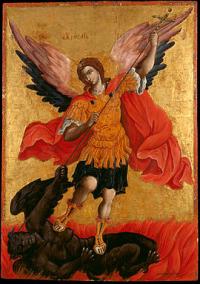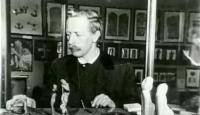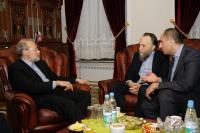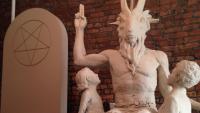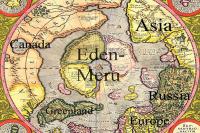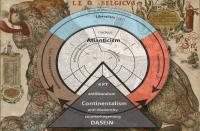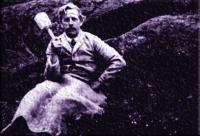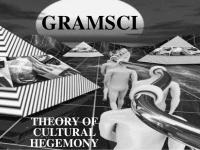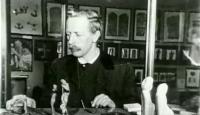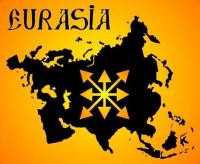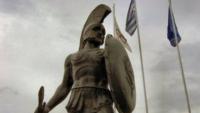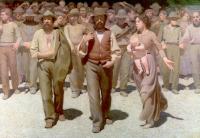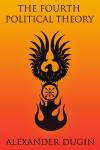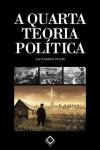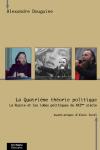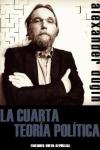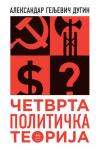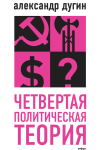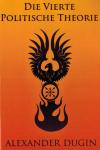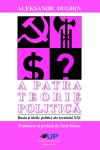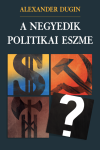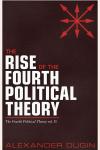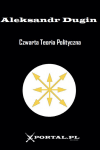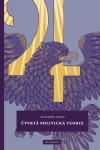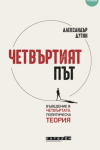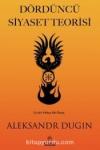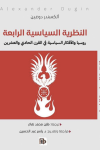Syria Under Fire: First Analysis
The US, UK, and France’s first missile airstrikes were rather improvisational and symbolic in nature.
Iranian, Russian, and Hezbollah forces were not attacked. Assad did not suffer strategically. The Syrian opposition, which expected much more, did not gain any serious advantages. Mass demonstrations in support of Assad are being held in Damascus.
Russian commentators have pointed out that France itself did not launch any missiles - all those launched were by British and American military forces.
Judging by the fact that all the missiles were launched at targets at a careful distance from the location of Russian soldiers, it seems that Mattis’ line won out in the US, as opposed to that of Bolton, who has insisted on directly attacking Iranians and Russians.
DECONSTRUCTING THE “CONTEMPORAL MOMENT”: NEW HORIZONS IN THE HISTORY OF PHILOSOPHY
Man, as the cosmic mediator, is situated on the border between both worlds, between Tradition (above) and modernity (below). He is always straddling this border, eternally, in both the era of Tradition’s predominance, and in the periods in which modernity temporarily wins. In his eidetic, eternal dimension, man himself is this border, and the movement of his spirit, his thought, his ways and methods of philosophizing, outline the content of that which lies on either side. Through his choice of orientation, spiritual or corporeal, man constitutes the time, the epoch, the age in which he lives.
Thus, residing in the “dark age”, the Kali-Yuga, is neither a fatality, a punishment, nor something arbitrary, but the Night’s testing of the grain of eternity, of the divine center that comprises the essence of man. In other words, no matter how far away the Golden Age might be, a kernel of it remains within man as hope, as opportunity, as a fulcrum, which can always be found in refusing to unconditionally and fatalistically (or unconsciously) accept the conditions of the Iron Age. Time is an illusion. The historial is no more than a sign, a metaphor that can be deciphered in different ways and appealed to freely. We ourselves choose the time in which we live. And if man is born in the modern world and in the West’s zone of influence, this means that he is included in the profound plans of eternity, and this reflects his mission and fate. Modernity is in Tradition, and Tradition is in modernity. But in different sections of the vertical world, their proportions adjust to being polar: in Heaven (Tradition) there is only a drop of hell (the Biblical serpent that first appeared in paradise), and in hell there is a drop of Heaven. But this is enough to stretch a semantic thread of sacred history, or hiérohistoire (in Henry Corbin’s formulation) between these drops.
The Pole of the Russian Circle: Moscow’s Place in the Sacred Geography of Russia
Questions of geography are very tightly linked to psychological archetypes. Every people, every civilization, every culture sees and understands space in its own unique way. There always exists a kind of code that serves as a distinctive trait of the national territorial myth.
Reconstructions made by modern historians of religions, sociologists, and anthropologists allow us to speak of an entire science (sacred geography) that predetermined our ancestors’ perception of the surrounding world in its spatial dimension. The norms of this sacred geography formed the foundations of epics, biographies, legends, traditions, myths, and fairy tales.
As the rational aspects of life developed, this sacred geography became part of the unconscious, thus determining deep psychic archetypes, rudimentary reactions, and the typology of slips and dreams. Having disappeared from the ancient stage, the geography of the myth passed into the sphere of subconscious reactions; however, this does not mean that it lost its hypnotic power.
There are peoples who visualize their homeland, their country, as an island. Others see it as a plain hemmed in by mountains. Still others see it as a space between two or more great rivers, or as an uninterrupted mountain range, or as a coastline, and so on and so forth. It is on the basis of this sacred geography of the homeland that an idea of the entire cosmos is formed.
Moscow as an Idea
Moscow is not just a great city, not just a great capital, not just the symbol of a gigantic Empire. Moscow is a basic concept of theology and geopolitics.
Moscow has been called the “Third Rome” not merely as a metaphor or self-indulgent manifestation of purely national pride. Everything goes much, much deeper. Orthodoxy knows the special teaching of the “three Romes.” The first was imperial Rome before Christ, the same state on whose territory the Son of God set foot on earth. This Rome was a universal reality that united enormous spaces and manifold peoples and cultures in civilizational unity.
The Second Rome, the New Rome, was Constantinople, the capital of the Roman Empire, which had accepted the blessing of holy christening. From that point forward, the Roman Empire acquired a strictly ecclesiastical, deeply Christian meaning. The Orthodox Emperor (Basileus), as head of the Empire, was identified with the mysterious person from the Apostle Paul’s Second Epistle to the Thessalonians: the “withholder”, “katechon”, who in the end times is fated to prevent the “coming of the son of perdition.”
The coming of Christ is a central event in world history. Everything that preceded it was a presage. What followed it was the universalization of the Gospel. And, in the Orthodox conception of the world, the center of history in the Christian era was Rome, the New Rome, Constantinople and its ruler, the Orthodox Basileus.
Existential Dutch: stolen identity (letter of Dutch philosopher)
Heidegger himself later called Sein und Zeit the most old-fashioned book ever written. We believe that in the way our economically driven political speech develops, we experience that in Dutch ‘ de wal het schip keert’ , meaning literally that the shore is the only thing that can stop the ship. We are caught up in a form of management. The thought of an Eurasian continent as a mediator between the Atlantic and the Asian might for a Dutch metaphysician be felt as the relieve of a burden. Heidegger saw his own mission in preparing European thinking for a confrontation with the East.
Bringing the geopolitical question back in the philosophical and political agendas means also the necessity of posing the question of the relation between the two. After all the question of politics is again the Schmittian question of friend or foe. When we would be so bold to identify the foe with the antichrist, Heideggers remark in the black notebooks spring to mind: ‘In relation to liberalism the antichrist is a small boy’ .
To work on a new political theory is a matter of great importance, but also a thing that requires great care. Perhaps this care, Sorge, for Heidegger in Sein und Zeit the unity of Dasein, is the driving force itself.
Introduction: The Aims and Tasks of Noomakhia
The title of Noomakhia, which literally means “war of the mind” (Noomachy) [4] – and which can also be conceived of as “war within the mind”, “war of minds”, or even “war against the mind” – is intended to emphasize the conflictual nature of logoi structures as well as the multiplicity of noetic fields in each of which surprises, conflicts, aporias, struggles, contradictions, and opposition lie in wait for us. The field of thinking is the field of warfare [5]: thoughts wage ceaseless wars not only against phenomenality, matter, and their own reorganization into elements (whether existing or not is an open question), natural law, dispersion, non-structurality escaping the “control” of multiplicity, etc., but also against other types of thoughts, other thoughts, and the complex diversity of vertical and horizontal, noetic and noeric chains which permeate the reality of the world on different planes and different geometries. Wars between people, including even the most cruel and bloody, are but pale comparisons to the wars of the gods, titans, giants, elements, demons, and angels. And these, in turn, are but figures illustrating even more formidable and profound wars unfolding in the Mind, in the sphere of the Nous and its limits in which the Mind itself borders the zone of Madness. Thus, everything is Noomachy, even that which is bigger and came first of all – ϋπερπαντα. War, according to Heraclitus, is the father of all (πολεμος πατηρ παντων). Indeed, it is about this, the “father of all”, that Noomakhia is written.
Priests and Warriors should regain its essential position
To overcome the Modernity is not easy. Any alternative will be impregnated by the some modern prejudices. We need be afraid of nothing – including regress, authoritarianism and so on. We are ashamed of all such phenomena because we are still Modern. I like communitarianism. It has in itself something premodern as organic community of people living in the personalized relations to the nature and each other. But we shouldn’t exclude the imagination of Empires, hierarchies and most of all sacredness, We need to restore all three traditional types – Priest, Warrior and Peasant. The economy is the field of peasant. So the peasant community and small manufacturers are the base of the material aspect of society. But outside of Modernity the materiality is the last concern. So the real basis of the society should be the Heaven – spiritual life, sacred values. The Earth should be once more conquered by the Heaven. So the Priests and Warriors should regain its essential position. So we need reverse the Modernity that began with quite opposite with the putting the material over spiritual, the Earth over the Heaven.
We are the Church of the End Times
The Romanov period saw a continuous process of Russian Orthodoxy’s silent return to pre-Petrine times; this was not a conservative-revolutionary path (as with the Old Believers), but a conservative-evolutionary one whose existence was due mainly to the archaic nature of the provincial clerics and the multitude of simple parishioners. In a certain sense, the enthronement of the antichrist in the Church did not fully succeed, despite the fact that during the individual intervals of Peter the Great’s rule the impression formed that this was taking place. Still, because of some higher reasons, the final chord was delayed, even though the forces of the antichrist multiplied tenfold.
Although it was at the price of compromise and adaptability, Russian Orthodoxy maintained its unity, the legality of its hierarchy, eucharistic succession, and loyalty to the fundamental norms of patristic tradition. The Saint-Petersburg stage was characterised by a certain split in the official Church. At the lower levels it moved towards the Old Faith, i.e. towards Orthodoxy in its purest form. At the top, it was oriented towards Western adjustments and norms, as official theology repeated the model of Catholic-Protestant teachings, and the general spirit was fully apostate. Nikon’s reforms significantly damaged both rites and liturgical books. The synod became an administrative agency in a bureaucratic, profane government.
Ethnos and Society
In this monograph, Dugin provides an overview of the primary foreign and Russian sources and schools that influenced the establishment of ethnosociology as an independent and original scientific discipline. Dugin offers a profoundly philosophical approach to the categories of the “ethnos,” “narod,” “nation” and “society,” providing clear definitions of these concepts, and expounding a broader ethnosociological taxonomy. For the first time in the field, this work brings a consistent approach to a broad spectrum of knowledge, as well as elucidating various methodologies of ethnosociological analysis, bringing everything together into a single, easily applicable system.
This volume is an invaluable manual for those specializing in sociology, philosophy, political science, cultural studies, ethnology, international relations, state, and law, as well as being of interest to those who follow the current developments in the humanities.
This volume is an invaluable manual for those specializing in sociology, philosophy, political science, cultural studies, ethnology, international relations, state, and law, as well as being of interest to those who follow the current developments in the humanities.
The Fourth Political Theory and the Italian Logos
The Fourth Political Theory treats the concept “narod” as an independent legal and philosophical category, beyond its interpretations in the context of the three political theories of Modernity. But the “narod” is understood existentially, as Dasein. Heidegger’s formula “Dasein existiert völkisch” is key. The Fourth Political Theory understands the narod, the populus, as Dasein, Volk als Dasein. That makes the phenomenon of populism not indistinct, chaotic, and spontaneous, but deeply grounded, philosophical, and avant-garde. In this case, the Fourth Political Theory can be regarded as a “metaphysics of populism,” explaining its appearance and supplying the blind protest of humanity against the satanic elite that has seized power over it with a strategy, consciousness, thought, a system, and a plan of struggle.
To conclude this preface to the Italian edition, I want to emphasize: the Fourth Political Theory appeals to everyone – to traditionalists, socialists, liberals, conservatives, persons with convictions and persons without convictions. It is an invitation to think, and not the imposition of ready-made judgments or models. Our goal is to awaken in Italian society an interest towards political philosophy, towards ideas and towards an acute – truly Italian – perception of reality.
The Fourth Political Theory and the Italian Logos
I admire Italy, or more precisely the many societies, cultures, peoples, and states comprising the history of Italy from the Etruscans and Roman Empire to the Vatican and Risorgimento. I dedicated a separate book to the “Latin Logos,” where I expressed my love for the Italian spirit and for the beauty of dramatic and elevated Italian thought.
CRISOLISM AND THE RELEVANCE OF DUGIN´S FOURTH POLITICAL THEORY FOR PERU AND LATIN AMERICA
Peruvian social scientists are reducing their work to the strict academic terrain, this relationated with the fear of social rejection and labor ostracism, which would imply their participation in political projects and social reforms, this situation is generating that, today, political parties are in a lack of doctrine, strategies and coherent programs. The decline of the Peruvian political parties, we endorse, is also determinate by the flight of thinkers and social scientists from them.
Due to this situations, and in order to amend them, investigations are being carried out in Peru, in such areas as political philosophy, metapolitics and geopolitics. For the sake of identifying the real obstacles that interfere with our progress as a nation, and to give with this the necessary tools for the institutionalization of a political project. It is the return of social scientists to the political arena, since today, far from the humanities, the Peruvian political parties are only political companies, prey to corruption, improvisation and clientelism.
The Logos of Europe: Catastrophe and the Horizons of Another Beginning
Modern European civilization is the historical continuation of Mediterranean civilization. The Indo-European element is predominant in this continuity, as the Indo-European tradition makes up Europe’s main linguistic and cultural matrix. If we recall Dumézil’s reconstruction of the trifunctional system here, then we immediately obtain a sociological map of Europe, the social structure of which is dominated by a constantly reproduced principle of three prevailing castes: priests, warriors, and producers. Indeed, we encounter none other than this stratification of European societies at the most different historical stages and under different names and titles.
The classic expression of this order was the ancient epoch of Mediterranean societies beginning with the Achaean conquests and Homeric Greece. Such a system was characteristic of Ancient Greece and Rome with the exception of periods of decline distinguished by a strengthening of the political positions of “urban dwellers”, who represented a mixture of higher castes with uprooted peasants that gave birth to a new type of merchant hitherto alien to classical Indo-European societies. This type of merchant could have taken shape through the degradation and materialization of the warrior caste (which Plato describes in his Republic as the phenomenon of timocracy), or from below through a specific deviation from social type on the part of former peasants or urban artisans. It cannot be ruled out that this was the result of influences that were altogether foreign to the Indo-European cultural circle, such as Phoenician or, more broadly, Semitic cultures, for whom trade was a widespread social occupation. In the city-states of Greece, “urban dwellers” and “citizens”, i.e., “townspeople”, formed a specific social milieu in which the three classical functions of Indo-European society found parodical manifestation. In the very least, this is what Aristotle presented in his Politics. The authority of king-priests (the sacred monarchy) transformed into tyranny. The domination of the warrior aristocracy gave way to domination by a financial oligarchy. The organic self-government of ethnically homogeneous and solidary communities (polity) became “democracy”, or the power of the sporadic and disparate crowd unified only by territory of urban residence.
CHRISTIANITY AND SCIENCE
If one takes the third position on religion and modern science, life will become difficult (perhaps even unbearable). In this case, we must not only distrust the ideology of the modern (definitely non-Christian, often directly anti-Christian) society, but also the world itself, which, if we think about it, is pushed onto so heavily onto us by the entire structure of upbringing, education, study, and culture that we are convinced that it is reality, nature, existence, truth. Once can debate an ideology (although this is difficult, if it is a totalitarian one like all Modern ideologies: communism, fascism, and the most totalitarian one of all, liberalism!), but to distrust one’s own sensory organs, to see that which ‘isn’t’ behind ‘natural’ phenomena (as was said to us by our parents and teachers), i.e. the cosmological power of angels and demons is a direct road to insanity.
I do not know the answer to this question, as it can neither be easy nor understood. I can only express certain assumptions without being confident in neither their effectivity nor their ability to change anything.
First, we must give ourselves the task of fundamentally researching the philosophy of Plato and Aristotle. This demands effort, but it is the foundation of Christian thought. Without Plato, the fundamental theological theses of the Cappadocian school, or even the most fundamental teachings about the Trinity, creation, etc., to say nothing of the Aeropagites, asceticism, or hesychasm would have no foundation at all. The fundamentals of Christian theology were developed by the Platonists. And it is Platonic cosmology (with Christian corrections) that was patched into this philosophy. In the Christian context, this corpus is most clearly represented by the Aeropagites, in the West by Scotus Eriugena.
IN DEPTH: Nationalism in the Third World and the Idea of a Fourth Political Theory
e are talking about ideologies such as Chavismo in Venezuela, undoubtedly patriotic socialist doctrine, based on the political creativity of Hugo Chavez, who managed to forge a Fourth Way in relation to liberal-capitalism, communism and chauvinistic nationalism, reconciling its Peronist and Velasquist influences with perspective of a Communal State based on the productive autonomy of the workers. Your purpose? As outlined in his Plan de la Patria, establishing a multipolar and pluricentric world order and effectively building a socialism based on patriotic values in Venezuela.
THE ECONOMIC PERSONALITY
The pure individual must be a carrier of physical immortality, as there will be nothing in him that could die. There should be no hint of structure or filiation in him. He should be fully liberated of all forms of collective identity and also of existence. This is the ‘end of economics’, the ‘death of the person’, while at the same time being the flowering of chrematistics and the immortality of the (post-human) individual.
The seed of the human rots, but in its place there is no resurrected life, but a simulacrum, an electronic Antichrist. Capital is etymologically related to head (the Latin caput), i.e. capital has historically been a preparation for the coming of artificial intelligence.
So what does the economic aspect of the Fourth Political Theory, which challenges liberalism in its final (terminal) stage, consist of?
We must theoretically affirm a radical return to the integral worker, to the economic person against the disintegrated capitalist ‘order’ (organized chaos to be more precise) and the chrematistic individual. This means radical de-urbanisation and a return to agricultural practice, to the creation of sovereign farmer’s communities. This is the 4PT economic program: the resurrection of economics after the dark night of chrematistics, the rebirth of the economic person from the abyss of individualism.
THE REALM OF THE FOURTH POLITICAL THEORY: CONTRIBUTIONS
According to Ultra-modernity, everything that is said now will be claimed wrong within, say, twenty years. Remember, though, that you will be a grandparent yourself. So, are you ready to be thrown in the trash can in your days of old? Or will you simply refuse to grow old, considering aging a disease and trying to stop it? Because these are the days we are living: we will have to work hard for the right of being both right and old.
There is a very simple test that you can make, even if you do not know much about Geopolitics or Political Philosophy, to see on what side you are. It goes like this: if your people/territory/identity accepts most tenets of the Western culture, will the best ways of your grandparents fade or will they blossom?
The Rise of the Fourth Political Theory
The sequel to the bestseller The Fourth Political Theory, expanding further on the fourth political theory. All the political systems of the modern age have been the products of three distinct ideologies: the first, and oldest, is liberal democracy; the second is Marxism; and the third is fascism. The latter two have long since failed and passed out of the pages of history, and the first no longer operates as an ideology, but rather as something taken for granted. The world today finds itself on the brink of a post-political reality — one in which the values of liberalism are so deeply embedded that the average person is not aware that there is an ideology at work around him. As a result, liberalism is threatening to monopolise political discourse and drown the world in a universal sameness, destroying everything that makes the various cultures and peoples unique. According to Alexander Dugin, what is needed to break through this morass is a fourth ideology — one that will sift through the debris of the first three to look for elements that might be useful, but that remains innovative and unique in itself.
"POST-TRUTH” AND THE TRUTH OF THE POLITICAL: FREEDLAND VS. DUGIN
Unlike Dugin, for Freedland there is only one truth in the world, which cannot be questioned at all. The British journalist completely ignores the so-called autonomy of the political, such as the fact that politics is not based on rationality, but on irrationality. As we learn from the German jurist Carl Schmitt, politics means acting to defend or impose a particular type of collective existence, beyond what is morally right or wrong and what is objectively true or false. Freedland is very surprised by the actual trend towards a «deeper and more bitter partisanship», but this fact only means that what is happening in countries like his own it’s simply the return of politics in contexts from which it was almost gone. Politics divides people into different groups, which are aggregated around a particular “speech”, or a particular “narration”, or, as Dugin teaches us, around a particular “truth”. To Trump’s supporters (like those of any other political leader) doesn’t matter if what their leader says is true or false; they only identify themselves in him and in his political view. So politicians like Trump are neither “engaging in post-truth politics” nor lying, but they are only making politics. Furthermore, Freedland should understand that in politics there are indeed no referees, but only players. In fact, there are referees only when there is someone who commands on all the others and who has the monopoly of the truth.
Revealing Traditionalism
The Ways of the Absolute was written in 1989. Its main task was presenting the foundations of Traditionalism, exhibiting how Tradition understands the most important metaphysical problems, and on what philosophical principles the sacred worldview is built. We considered the present work to be a kind of introduction to Traditionalism, as transmitting into the Russian context the main lines of such eminent modern Traditionalists as René Guénon (the founding father of this tendency), Julius Evola, etc. We pursued an altogether definite purpose, and it predetermined the topics selected, the methods of presentation, and the emphases. It was extremely important for us to at once put Traditionalist through in its proper context, and show its radical non-conformism, its rigid alternity to academic, “humanitarian” and profane philosophical trends in modern culture. Traditionalism is not a history of religions, not a philosophy, not a structural sociological analysis. It is more of an ideology or meta-ideology that is totalitarian to a considerable extent and places rather harsh demands before those who accept and profess it. Either man breaks with the totality of the worldview cliches of modernity diffused throughout his environment, completely revises his views and positions, investigates the profane genesis and then rejects them all at once in order to accept the norms of Tradition with perfect confidence and strict conviction, or he will remain essentially outside of it, outside the sacred fence, in the Eleusinian swamps of the modern world in which there is no fundamental difference between highbrow professors, philosophers, and the obedient, absolutely unreflective mass of laymen, including even those intellectuals who for “academic” reasons are interested in various “extravagant” subjects, such as theology, rituals, symbolism, traditional societies, etc.
Christian Metaphysics: The Essence of the Problem
Christianity is that tradition whose metaphysical dimension has been studied least of all. This is quite a paradox since one would think that such a deep study of Christianity, the religion of the West, would attract all those interested in metaphysics and who, following Guénon, are trying to make sense of the most profound aspects of Tradition. Nevertheless, the disputes surrounding Christianity in Traditionalist circles are, as a rule, limited to fairly secondary, practical issues regarding the virtual initiation of the sacraments, the absence of an idea of cyclical time, etc. In all of this, one can see a tacit consensus among Traditionalists that Christianity is nothing more than a reduced, incomplete tradition whose esotericism has been practically lost, and whose metaphysical content cannot be detached from the dense veil of exoteric scholastic theology and the hazy subjective intuitions of mystics. All attempts to identify any consistency between the basic principles of Christianity and the conceptual categories of other, more metaphysically developed traditions (primarily Hinduism) have yielded rather poor results and have been based on strained interpretations and biased urges to arrive at any cost at conclusions which match Guénon’s own ideas.
Orthodoxy, for its part, despite having preserved ontological and metaphysical wholeness, from a certain time onward could no longer assert its metaphysical content (i.e., actual Christian metaphysics) in clear categories. Shortly after the “Palamite disputes” when Orthodox esotericism experienced its last dazzling rise in history, this line was somewhat marginalized and “frozen”, as priority was given to the exoteric sides of the Church. In the late 19th and early 20th centuries, many Russian theologians and even secular philosophers, intuitively surmising the special metaphysical nature of Orthodoxy, attempted to formulate certain principles for reviving the forgotten dimension of this tradition. However, most of these attempts did not yield serious results since none of them were familiar with the works of Guénon. Hence why only now, in our opinion, is it possible to acquire adequate knowledge of the most important proportions of the structure of fully-fledged metaphysics.
Herman Wirth and the Sacred Proto-Language of Humanity: In Search of the Holy Grail of Meanings
In Wirth’s view, the main key to understanding this language, and all existing languages and traditions, is the year. The year and man, the year and God, the year and nature, the year and time, the year and space are, in Wirth’s view, synonymous concepts. Man is the embodiment of condensed time. Time in and of itself is a divine manifestation.
The northern, polar cycle is the highest knowledge and, as follows, everything else is to be explained through the calendar. Special attention should be paid to the natural features of the North Pole. We know that a day there lasts not 24 hours, but six months, as does a night. For example, such a notion as the “midnight sun”, which is addressed in many of the Dionysian mysteries and is a generally important element in multiple sacred theories, acquires an entirely natural sense in Arctida – natural-magical meaning. This is the sun that shines at midnight at the North Pole during the summer solstice. Indeed, there is sun, and there is midnight. The memory of this midnight sun, like the memory of the primordial homeland of our ancestors, has been preserved in traditional models and been passed down from generation to generation in the form of legends and stories.
EURASIAN LAUGH
Now I am approaching the end of my Magnum Opus Noomahia. It should consist of 20 big volumes dedicated to different civilisations. 18 are already finished and published. That is most important for me because it is a sort of Encyclopaedia of Multipolar World or else Anti-Encyclopaedia of Enlightenment, or Counter-Modern Encyclopaedia deconstructing the eurocentrism and Western Modernity and affirming the right of the people to create their own civilisations basing on their own values. It is the plan for global radical revolution against the Modern World, globalism and the domination of the West. But at the same time it is defence of the deep - Premodern — european identity destroyed by the capitalism, liberalism and anglo-saxon ideological dictatorship.
My life is the proof that ideas do matter. More than anything else in the life. More than life itself.
I will fight for my ideas and for the revival of deep Russian identity till the end. And we will see who will laugh the last. So I strongly believe in the final Eurasian laugh over the smoking ruins of the present world that should end.
Horizon of the Ideal Empire
It will be a huge Empire. The richness of the landscape and the diversity of the polities will be intrinsic to the state. The Empire principle must be rehabilitated. Besides the trifunctional system (philosophers, warriors, and farmers), the Empire can include enclaves of a variety of creatures from Amazons to two-headed, bird-legged, and headless beings, gypsies, Evenki, etc. There could even be a mermaid republic or Veche forest gatherings governed by an assembly of Domoviye and Leshie. We can also imagine a congress of Angels or Tatar Kurultai.
A plurality of types of political and anthropological creativity should be encouraged.
TV and the press will be cancelled, as they are always spouting some kind of meaningless nonsense.
Clothing will have its own meaning. The body is the wrapper of the eidos, and the clothes are the wrapping of the body. Everyone will have different clothes, but all colorful and astonishingly beautiful, so that people pay attention to them. People will notice clothes and judge by clothes. There will be an absolute cult of clothing. People will spend most of their time getting dressed and changing.
Food will be the most ecologically pure, and distributed freely, as a gift. There will be an exceptional lot of sausage, cheese, and hazelnuts in the Empire.
THE FOURTH POLITICAL THEORY AND THE PROBLEM OF THE DEVIL
The most important point is that 4PT is based on the fact that the choice of paradigm is not within the three political ideologies (the Logos of the Great Mother), but within the three Logoi of the political philosophies of the Father (Platonism), the Son (Aristotelianism), and the Mother (materialism). This is a free choice in which modernity is nothing more than one option, and far from all.
The political philosophies of the Father and the Son (or their alliance) are objects of free choice. This is a task, not a given. It appears that we ended up in modernity because we forgot that the political philosophy of the Father and the political philosophy of the Son need to be constantly affirmed anew with each new generation and new person. We took them for something guaranteed, something taken for granted.
As soon as even a vertically-oriented political system becomes inertia or something ready-made and given, then it begins to fall, to collapse. If instead of as a free establishment we take the monarchical, imperial, traditional, and caste vertical to be a fact, something given, and once we no longer re-affirm such at each stage, then sooner or later we will fall into the dustbin of modernity and its last logical accord - the political philosophy of the Mother.
The Metaphysical Roots of Political Ideologies
Characteristic of “servants of Magical Matter” is pure agnosticism, i.e., a third way between Gnosis and Faith. The agnosticism of mystical materialism is conditioned by the inadmissibility of the subject questioning knowledge, since the subject, as part and parcel of the cosmos, is merely one of the facts of this cosmos and nothing more, thus the subject’s reflective capacity (its mind) cannot add or subtract anything from the flow of the cosmos. In this view, knowledge is identical with cosmic fact, but insofar as the cosmos is in motion, knowledge is identified with practice, i.e., it is simply discarded. In other words, agnosticism is the result of the absence of the pair of “knower” and “known” which is necessary for knowledge itself. For the proponents of Magical Matter, the absolute surface of the world coincides with its absolute depth. Here it would be interesting to recall Nietzsche’s aphorism regarding how “a woman needs to find depth in her superficiality.” Such an analogy is no accident, since the ideology of Magical Matter bears an openly gyneocratic, matriarchal character, in some sense being a projection of the female subconscious closed to itself.
POST-ANTHROPOLOGY
A concrete (phenomenal) society always consists of two parts - the aboveground and underground. The aboveground part is what we normally term “society", meaning a sphere of rational activity where logos (λόγος) prevails. This is the domain of the “diurnal". The underground part is the dark, underwater island of the collective unconscious, the region of the social night (the “nocturne”), where myth (μύθος) rules.
For some time, progressivist science believed that these two parts were situated in diachronic order. In ancient times (and among “primitive” peoples, the unfortunate “residue” of ancient times), myth was predominant. But the progress of civilization gradually supplanted the mythological order and replaced it with an order based on logos. The community, or Gemeinschaft, is superseded by society, or Gesellschaft (F. Tönnies). But this optimistic exaltation did not last long. Whereas blind faith in purported progress reigned almost unquestionably in 18th-19th century Western Europe, the subconscious, where the eternal and unchanging laws of myth predominate, was discovered by the beginning of the 20th century.
Encounter with Heidegger: An Invitation to Journey
Heidegger is universally recognized as a great philosopher of world history. No one seriously contests this, but someone calmly passes by, relying on other trends in philosophy, while someone responds keenly to his message, using his terms ("Dasein", "existential", "Angst", etc.) and allowing himself to be carried away by his thoughts.
A different, special, exclusive place in the history of philosophy that can be set aside for Heidegger should be recognized in the case that we fully trust Heidegger, immerse ourselves in his thinking, and make him our highest authority. In other words, Heidegger in the space of Heideggerianism will differ essentially from Heidegger in the average and conventional history of philosophy. In this case, Heidegger will be revealed not only as a great philosopher, on par with the other greats, but as the greatest of them all, occupying the place of the last prophet, concluding the development of the first stage of philosophy (from Anaximander to Nietzsche) and serving as the transition, the bridge to a new philosophy, which he only anticipates in his works. In that case, Heidegger is revealed as an eschatological figure, as the final interpreter and clarifier of the deepest and most enigmatic themes of world philosophy and the creator of a radically new thinking. In this case he can be viewed as a figure of the religious pantheon, as an "envoy of being itself", a prophesier and preparer of the greatest event, in which the old history of the European world will end and a new one, which has never been hitherto, will begin.
It seems to me that the second approach is more productive for a true understanding of Heidegger (even if at some time, in the distant future, it will be revised). It allows for full and complete immersion into Heidegger's thinking, without hurried attempts at interpreting him through appeals to other authorities (and to their separate traces in our consciousness) and allows Heidegger to communicate to us without hindrance what he intended to communicate. And only after accepting this message in its main features and believing in its significance and inevitability can one, if need be, take a certain distance in regards to it.
Fourth Political Theory: shortest presentation
The problem is where can we find the fulcrum? The Modernity and Post-Modernity - precisely by means of Third Totalitarianism (this time liberal one) - have destroyed already the humanity and replaced it by the assembly of individuals (human rights doctrine). Refusing normative subject of all-pervading liberalism (individual and - in the near future - post-human species) we are in the void because liberalism doesn’t accept institutionally (!) any form of non-individual onthology and anthropology. And the pre-modern version of subject, of human nature are considered to be obsolete and miserable – in the extreme case criminal. If we insist nevertheless they will qualify as the residui and treat us in the same manner as in the first stage of Enlightenment - simply killing us as Jacobins and bolsheviks killed the Christians priests and princes. May be it is an option for certain men and women. The way of martyrdom is great path.
But there is other solution. Not being able to certify our own existence in the conceptual field of totalitarian liberalism we can make appeal to Heideger's concept of Dasein. When the concept of human being is obligatory fake and the liberal totalitarian culture splits the human figure more and more depriving it of any order or unity as well as of any collective identity (more than that --depriving it of any identity at all) Dasein nevertheless is here - it is always here or rather t/here. It is here - existing in authentic or inauthentic way, but it is here! So 4PT invites to take Dasein as the axial fulcrum when everything else is missing. The return to the Tradition and to the Eternity can be accomplished neither by individual nor by class or nation. Dasein is the ontological root of the human being, the nucleus of Being. Dasein can be put in the wrong way of functioning but still it is present. So it is our final argument and the main feature of 4PT. Fourth Political theory is existential. And starting from Dasein we can make the eschatological leap to the Tradition. Else we would lack the foothold. Traditionalism is to be existential otherwise it will be but one simulacrum more.
Herman Wirth: Runes, Great Yule, and the Arctic Homeland
There exists no greater mystery in human existence than the mystery of life and death, dying and becoming. For man, the Year is the supreme Revelation of divine action in the Universe. The Year is the expression of God’s providential cosmic law, in accordance with which occurs the becoming of the world in the infinite and everlasting return. The most magical and profound phenomenon before us in nature is the Year of God. A number of days makes up the Year, and in each of these days is opened the image of the Year: the birth of the Light from which comes all life, its climb to the highest peak, and its descent, death, and sinking, only to rise again. The morning, noon, evening, and night in a day correspond to spring, summer, autumn, and winter in the Year.
THIRD WORLD WAR: THE BEGINNING?
What happened on April 7th, 2017 could be the beginning of a Third World War. As a rule, nobody wants war but, alas, wars happen, and sometimes world ones. Therefore, I posit that first and foremost, as in the case of any disaster, it is necessary to remain calm and gather one’s thoughts.
On April 7th, 2017, for the first time in the years since the beginning of the conflict in Syria, the US Air Force launched a massive Tomahawk missile attack at a Syrian airbase, i.e., at us. Why did we not use a missile defense complex? According to one theory, we we lack a sufficient number of them to repulse a full-fledged attack by US troops, as they are designed primarily against the missile attacks of other potential enemies. The second theory is that Moscow did not dare give the order since such would mean the irreversible beginning of war with the US. Washington dared to, and knew what it was doing. We didn’t. Before proceeding to forecasts, it is worth once again examining the context, the starting conditions of what might become (though still might not) the Third World War.
Counter-Hegemony in the Theory of the Multipolar World
The classical realists use the term “hegemony” in a relative sense and understand it as the “actual and substantial superiority of the potential power of any state over the potential of another one, often neighboring countries.” Hegemony might be understood as a regional phenomenon, as the determination of whether one or another political entity is considered a “hegemon” depends on scale. Thucydides introduced the term itself when he spoke of Athens and Sparta as the hegemons of the Peloponnesian War, and classical realism employs this term in the same way to this day. Such an understanding of hegemony can be described as “strategic” or “relative.”
In neo-realism, “hegemony” is understood in a global (structural) context. The main difference from classical realism lies in that “hegemony” cannot be regarded as a regional phenomenon. It is always a global one. The neorealism of K. Waltz, for example, insists that the balance of two hegemons (in a bipolar world) is the optimal structure of power balance on a world scale. R. Gilpin believes that hegemony can be combined only with unipolarity, i.e., it is possible for only a single hegemon to exist, this function today being played by the USA.
On the Question of Russian Runes
There exist several points of view as to what runes are. Some believe that runes are an altered version of the Latin alphabet that appeared in the 5th-6th centuries among the Scandinavians and Northern European Germanic peoples. Others suggest that runes were the ancient characters used for divination and recording texts which emerged only at a later stage and under the influence of Latin writing. These two points of view on the nature and origin of runes are considered to be the “scholarly” and “orthodox” ones.
But there is another theory of runes proposed by the German scholar, Professor Herman Wirth. We should mention from the outset that this theory is not recognized by broader scholarly circles. The reason for this neglect of Wirth is not so much his paleo-epigraphic and runological works as his assessment of the text famously known as the Oera Linda Chronicle, the story behind which resembles that of the Book of Veles. The Oera Linda Chronicle was discovered at the beginning of the 19th century and allegedly presented the most ancient history of the Germanic peoples (the Frisians) stretching back centuries to many millennia. The text was written in a special quasi-runic script and contained tales of pre-Christian mythology and the sacred history of the Germanic people. The Book of Veles (discovered only at the beginning of the 20th century) represented a precise analogue of the Oera Linda Chronicle, only applied to the Slavs.
Eurasia: A Special Worldview
The West believes that only its path of development, only its logic, and only its values are universal and common to all of mankind, and that all other peoples have simply not yet understood this. This means that the West, albeit temporarily (until they understand this), can and is even obliged to rule others. With such a blatant agenda, the West has in practice managed to colonize the East. This is no easy feat, but it managed to. But the West faltered in the face of Russia, Eurasia. We, Russians, opposed the West with something that stopped it in its tracks. It repeatedly tried to take us by force and ruse, but we held on. The East fell, but we didn’t. And we are holding out to this day. This is Eurasia as an idea.
Eurasia means not succumbing to the West’s claims to universality, rejecting its hegemony, and insisting that no one has a monopoly on truth, especially not the West. Eurasia is the possibility for peoples and civilizations to follow their own path and, if the logic of the path demands such, not only a non-Western one, but even an anti-Western path. This is Eurasia. This idea was understood by the first Eurasianists, Trubetzkoy, Savitsky, and Alekseev in the 1920’s. We too understand it. And Vladimir Putin understands it, since there is no other meaning of Eurasia.
The Rus of Rurik
The point is that both the Slavs and the Rus (like the Franks and Celts) ethnologically belonged to one Northern Aryan ethnos today known as the Veneti. In the days of old, one could stumble upon the name mentioned by Strabo – Vindelicum or Vendelicum (and the Baltic Sea was the Sinus Venedicus). Moreover, one of their names was Franks (the “free ones”) and the other was Slavs. As Eckhard wrote, “The Franks once dwelled near the Baltic Sea, where there is now the Vagria” (Franci olim ad mare Balthicum, ubu nune est Vagria). It should thus be clearly borne in mind that all of these ethnonyms are from later times. “The Franconian Slavs,” writes the 19th century Russian scholar Y.I. Venelin (Gutsa), “did not call themselves Vindelicum, just as they did not call themselves Slovene as the name existing only in ethnographic books. The very word Franks is a modern ethnonym derived from one of the names of the kings who ruled the ancient Vagria called Reges Francorum and who, according to Fredegar and the later chroniclers, were the descendants of the Trojan kings (the line of Priam). These are the Trojan Veneti settlers who formed the ruling, princely caste of whom Polybius wrote. According to him, they “differ little from the Celts, but speak their own language. The writers of tragedies often mention this people and speak of its many miracles.”
The Indo-Europeans
European modernity, which abolished religion, faith in the King and the Heavenly Father, the castes, the sacred understanding of the world, and essentially patriarchy, was the beginning of the fall of Indo-European civilization. Capitalism, materialism, egalitarianism, and economism are all the revenge of those societies against which the Indo-Europeans waged war, subjugated, and strove to remedy, which composed the essence of all Indo-European peoples’ history. Modernity was the end of Indo-European civilization. It naturally corresponds to the nadir. This is not an abstraction, for it affects us in the most direct ways.
No compromises will help us. Either we will disappear and be dissolved, or we must restore our Indo-European civilization in its entirety, with all of its values, ways, and metaphysics. If we want to preserve ourselves as a people, as an Indo-European people, we must wake up and be reborn in contrast to all that has been taken for granted in the world of modernity. To hell with this world of modernity.
Modern Populism
The people as a political concept is appearing today in opposition to liberalism. The liberals are hollering about a fascist or communist-fascist threat, and they are incapable of understanding the essence of the populist moment, which they interpret through old clichés. Hence why they are losing. Hence why they are doomed.
And yet both left and right are unanimous in thinking that this is only a moment, a limited period of time, a kind of quantum in historical movement. Probably no one can say whether the People and consequently populism is a system, program, strategy, or merely a temporary correction on the path of liberal globalization. The globalists had their moment in the early ’90’s – the unipolar moment. They ruined everything they could over thirty years, turning globalization and the unipolar world into a hideous caricature. The reformers in Russia in the ’90’s did the same with democracy. Now a different moment is arriving. The people is appearing on the stage of world history. This is a chance, a risk, a responsibility, and a challenge. But it is our moment. Not utilizing it would be a real crime.
Yes, that’s right, not taking advantage of such a populist moment would be foolish and even criminal. But is there such a crime that we have not yet committed? Alas, everything rests on our shoulders. Nevertheless, this is a wonderful, open opportunity for a true alternative, a Russian alternative.
The first conference was on 4 ª Political Theory
During the last days 24 and 25 of February was held in San Lorenzo de El Escorial the Seminar of metapolitics: "Keys and visions for a metapolitical resistance in Spain."
Half a hundred people from different and distant points of the Spanish geography, came to listen to the papers and participate in the round tables with the speakers who generously and selflessly responded to the invitation of the seminar.
In this way, José Alsina Calvés opened the sessions with the conference "Hispanism and Fourth Political Theory", where he gave a brief introduction on the nature and fundamental points of the 4th Political Theory proposed by the Russian thinker and philosopher Alexander Dugin, and on The idea of Hispanism and Hispanism as possible genuinely Spanish ways of expression for their own counterhegemonic discourse and for the creation of a differentiated geopolitical space.

